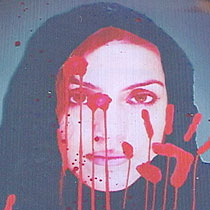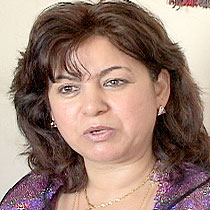2007年VOA标准英语-Kurds Speak Out Against Honor Killing of Women(在线收听)
Irbil
13 September 2007
The Kurdish region of Iraq is still coming to terms with the cultural and political ramifications of the brutal honor killing of a 17-year-old Yazidi girl in April. Men in her village killed the girl because she was in love with a Muslim boy. A video of the killing helped fuel public outrage after it appeared on the Internet. Human rights groups say so-called honor killings in Iraq are all too common and not limited to any one religious sect. VOA's Brian Padden reports on how one group is using the controversy in an attempt to educate the public and change the culture.
 |
| Honor killings, poster |
In April, men from the Yazidi sect, a religious minority in Northern Iraq, used cell phone cameras to record the killing of Do'a Khalil. The footage that appeared on the Internet shows men crushing her skull with cinder blocks. The scenes are too graphic for VOA to broadcast.
The art exhibit organizer Chilura Hardi is trying to sustain the public outrage that followed Do'a Khalil's death and change a culture that condones violence against women. "It's OK to raise awareness about it. Why these things are happening in the past? This is a different day and maybe we should look at changing these kinds of things."
 |
| Chilura Hardi, organizer |
She is quite critical of what she calls uneducated mullahs who blame women for the problems in society. "It is always women, women, women. And who's listening to all these talks that the mullahs are giving? [They] are men on Fridays. They go to Friday prayer and they are listening to this."
Imam Basher Al Hadad of the Jelil Hayat Mosque in Irbil says he cannot speak for all the mullahs, but he says the Koran does not condone honor killings.
"Women are human and killing humans without any just reason is forbidden. So killing women is also forbidden. You mustn't do it."
At the art exhibit Chilura Hardi says she is encouraged by comments she hears from some of the men in attendance. "Any man who sees this will be changed.
The honor killing is starting from the communities. So starting from the children, we have to learn them there is no difference between female and male."
Ultimately, Hardi says to end the practice of honor killing, leaders must speak out, laws must be enforced and attitudes towards women on every level of society must change.